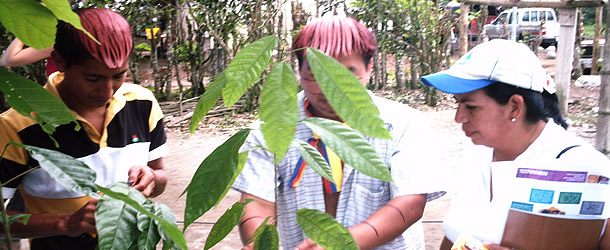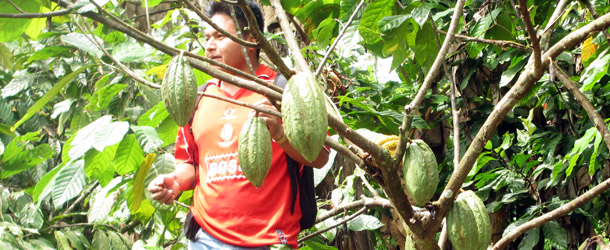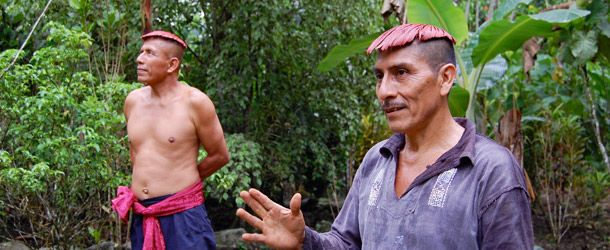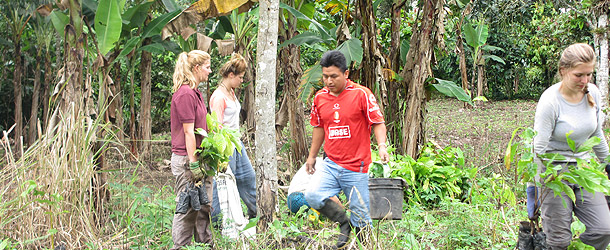Sustainable Agriculture
Sustainable Agriculture and Environmental Protection
Sustainable Cacao Production
Brief description of program:
As agriculture is the principal economic activity in the rural villages of Santo Domingo Province it is very important to increase the knowledge of agricultural systems that would deliver a better economic and social return while also protecting the environment. This is especially true in the Tsachila communities where they have only recently converted from living as a forest dwelling people to quickly having to copy mestizo methods of agriculture.
In order to provide a viable and environmentally friendly source of income we are presently working with local community members in several Tsa'chila communities to develop high quality organic cacao that could eventually be marketed nationally and internationally. Presently we have been working in the formation and technical capacity development of a group of cacao promoters. In 2008 these promoters started learning how to grow cacao in a nursery. Concurrent with Yanapuma’s approach, the cacao promoters were encouraged to serve as a community action group working towards the development of improved cacao as well as demonstrating the techniques required to their fellow community members. In practice however it has been difficult to establish this movement due to the very individualistic nature of the Tsa'chila culture. Their tradition of living as isolated families in the rain forest with no central community structure means that they do not naturally adopt the idea of sharing new knowledge with others. Instead we are continuing to support farmers in the development of new methods to the point where the benefits become obvious to all through the demonstration plots that we have helped create. Thus these pioneer Tsa'chila will become the agents of change for the community as other farmers seek to replicate their successes. We recognize that this will be a longer process than originally anticipated, but it is necessary in light of the cultural values and history of the Tsa'chila.
The ultimate goal of this process is to promote innovative sources of income generation through sustainable agriculture practices generated and disseminated by an agricultural community action group. In 2010/11 we aim to move on to the commercialization phase of the project with the implementation of simple accounting systems, an economic opportunities study, a marketing plan and the construction of a central cocoa collection point. Alongside these processes we aim to develop the capacity of the cocoa group through workshops and internal organizational building leading towards legalization. To implement this long-term strategic program we employ an agricultural specialist who continually works in the community.
We have also seen the necessity to focus our efforts on women farmers and on young farmers. Men and women farm separately in Tsa'chila culture and new knowledge does not get passed from the men to the women, even in the same household. We have also noted a greater aptitude for embracing change among the younger generation who are just beginning to farm. Together with the fact that many of them lack sufficient land to effectively support themselves using their current methods, we are focusing on finding ways to maximize production and add value to their agricultural output.
General Objective:
Improve the quality of life and well being of the local population by facilitating the development of sustainable agricultural practices, including cacao production, family sapling nurseries, vegetable plots, poultry rearing and other new practices.
Specific Objectives:
1: Increase knowledge about agricultural production systems and provide an alternative source of income through the promotion of cacao and other production and eventual commercialization
2: Facilitate capacity development exercises for the cacao association and agricultural community action group
3: Improve the possibilities of credit and diminish the risk of investment options in the region
2009 Project Actions:
- Replant the improved cacao plants grown in the greenhouse in 2008 in a designated location chosen by local beneficiaries
- Continue to work with cacao promoters, especially with regards to organizational development in order to promote better planning and increased motivation
- Begin to work with more people through the cacao promoters to continue technical capacity development
- Set up family sapling nurseries to produce trees for sale and reforestation with timber and fruiting trees
- Set up family vegetable plots to improve nutrition
- Set up family poultry systems especially with women and youth, to produce eggs and meat to improve diet and provide income
Reforestation through native tree nursery formation
Brief Description of project:
Recognizing that agriculture is the principal economic activity of an increasing population it is of crucial importance that the community of Bua de Los Tsachilas and the rural villages in the province of Santo Domingo can find equilibrium between agricultural production and the conservation of their forests and environment. Increasingly on a national level as well this will be crucial importance for a rapidly growing population attempting to survive off an increasingly fragile ecosystem.
This project works in tandem with the development of Cacao, as the new trees will provide natural shade for the cacao, enhancing the quality of the product and bringing back native tree species that were felled during the last twenty years. Beyond the goal of higher quality cacao and conservation, this project also aims to generate income for local families through the promotion of native and non-native tree nurseries. Currently we are in the process of obtaining seeds and collaborating with interested community members, who will grow these trees and then sell them to Yanapuma to reforest the water courses and eroded areas of the community, and in the future to people living in the wider region. This project also includes a series of workshops on natural resource management and environmental conservation. Finally, similar to other projects Yanapuma is currently developing we will promote the formation of an action group to facilitate project development as well as work long term to inform children as well as adults of the importance of the environment around them.
General Objective:
Implement a phased and progressive reforestation project to compensate for the high level of deforestation and soil erosion within the province of Santo Domingo.
Specific objectives
1: Generate income and expand reforestation in ecologically sensitive areas through the creation of tree nurseries
2: Implement workshops and capacity development exercises to participating beneficiaries
3: Reforest the water courses and eroded areas of the province in collaboration with local government and with participation of the community and volunteer groups.
2009 Project Actions:
- Form action group of interested community members
- Obtain seeds from regional seed bank to plant native and non-native tree species
- Work with Thinking Beyond Borders Volunteer Organization to reforest the circumference of the community of Bua de Los Tsachilas with the trees grown by the reforestation action group




